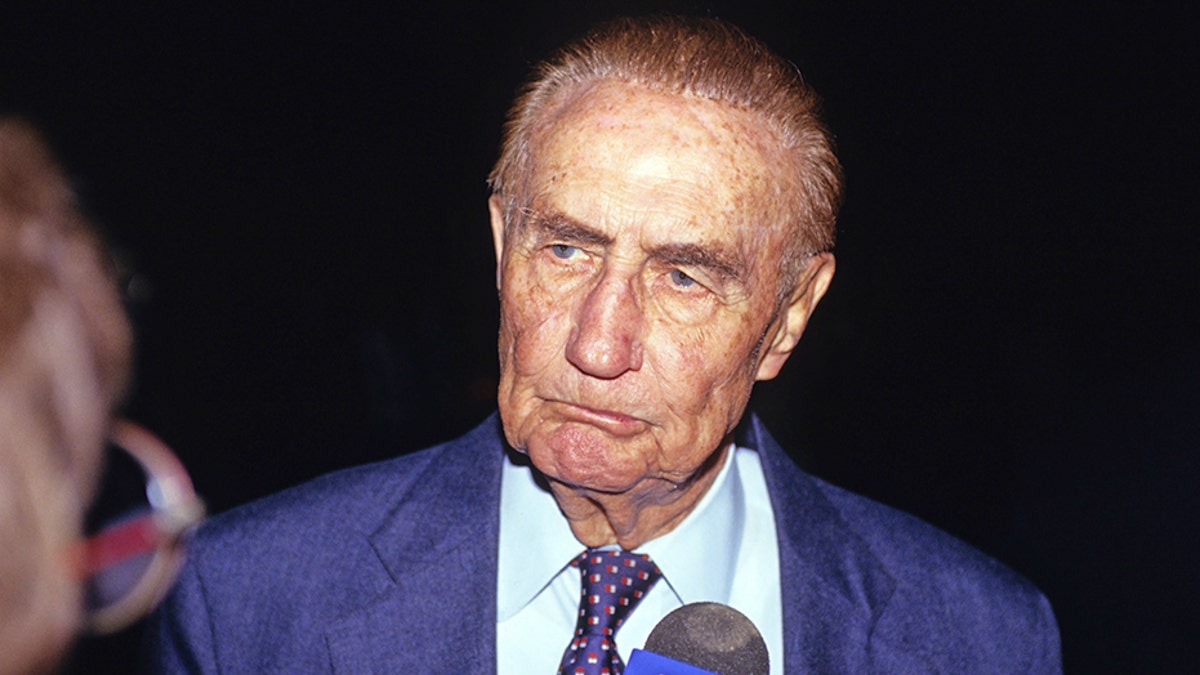
The Senate recently voted unanimously to change its rules and allow an infant on the floor of the Senate chamber during a vote. Tammy Duckworth brought her daughter to the chamber this week. The baby behaved well. But history has seen past senators, like Strom Thurmond, left, and Bob Packwood, do anything but. (AP)
Illinois Sen. Tammy Duckworth made a stir when she brought her 10-day-old baby girl, Maile, to work.
The day before, the Senate unanimously voted to change their rules and allow an infant on the chamber floor during a vote. The situation hadn’t come up much before. Perhaps it was because Duckworth was the first senator to give birth while in office.
Though the Senate unanimously agreed to the rule change, there were those that feared allowing an infant into the World’s Greatest Deliberative Body would disrupt decorum.
However, while Maile might have been the first baby in the chamber, the history of the Senate is full of people acting like babies.
The following are some of the most notorious examples:
--In 1798, the first senator to be impeached, William Blount of Tennessee, refused to show up for his trial. So the first Senate Sergeant at Arms, James Mathers, had to track down the fugitive. Blount refused to leave his home state, and ultimately the Senate dropped the case.
--In 1801, Vice President Thomas Jefferson published “A Manual of Parliamentary Practice for the Use of the Senate of the United States.” He felt it necessary to note that when a fellow senator is speaking, no one should be “hissing, coughing, spitting, speaking or whispering to another.”
--in 1841, Sen. Henry Clay, a leading Whig, questioned the character of a Democrat journalist who was the official Senate printer. Sen. William King, a Democrat, then questioned Clay’s character. Clay shouted back that King was a coward who had slandered him. King immediately sent a note to Clay, challenging him to a duel. They might have gone through with it if the Sergeant at Arms hadn’t arrested them. When things cooled down, they apologized to each other.

After the Civil Rights Act of 1964 passed, President Johnson sent the Senate Commerce Committee LeRoy Collins, a nominee who would mediate racial disputes. The votes were there, but Senator Strom Thurmond was no fan of Collins. Thurmond stood outside the committee room hoping to prevent a quorum by sending away late arrivals. Senator Ralph Yarborough walked up and Thurmond blocked his entrance. They actually removed their suits and started wrestling, before the Committee Chairman came over and broke it up. (AP)
--In 1850, during a heated debate, Sen. Thomas Hart Benton, a large man, moved down the aisle in a menacing manner toward Sen. Henry Foote, a small man. Foote pulled out a pistol. Benton, who had no firearm, shouted, “Stand out of the way and let the assassin fire!” Vice President Millard Fillmore, presiding over the Senate, decided it was time to adjourn.
--In 1856, Sen. Charles Sumner made a powerful anti-slavery speech where he called Sen. Stephen Douglas a “noisome, squat and nameless animal” and accused Sen. Andrew Butler of having a mistress ("The harlot, slavery.”) A few days later, Butler’s second cousin, Preston Brooks from the House of Representatives, came into the Senate chamber and beat Sumner unconscious with a metal-topped cane. Probably the worst altercation ever in the Senate, and a bellwether that the issue of slavery would not be settled without violence.
--In 1902, Sen. John McLaurin (South Carolina) ran into the chamber and challenged both the motives and honesty of Sen. Ben Tillman (also South Carolina). In response, Tillman punched McLaurin in the jaw. The Senate censured both men and passed a rule stating no senator shall imply of another senator “any conduct or motive unworthy or unbecoming a senator.”
--This one was not part of official Senate business, but it’s worth noting. In 1917, as Congress was preparing to vote on a declaration of war, three antiwar constituents, including a minor-league baseball player named Alexander Bannwart, visited the office of Sen. Henry Cabot Lodge. There was a flurry of angry words, then some shoving. Next, Lodge hit the ballplayer in the jaw. Capitol police arrested Bannwart. Lodge decided not to press charges, but he did vote to join World War I.
--In 1933, Sergeant at Arms Dave Barry wrote an article stating most senators weren’t crooks, just a few. He was brought before the chamber to explain his actions. He apologized, and tried to explain he thought he was defending the Senate. Though he was set to leave his job in a month anyway, they fired him.
--In 1946, Sen. Robert Taft disrupted a hearing on proposed medical legislation chaired by Sen. James Murray. When told to wait his turn, Taft started reading a statement. Murray got mad a Taft, saying he wouldn’t let anyone else talk. A 15-minute shouting match ensued, with Murray telling Taft to shut up, and Taft suggesting a recess until Murray had recovered his temper.

Sen. Bob Packwood. (AP)
--In 1950, Sen. Kenneth McKellar and Rep. Clarence Cannon mixed it up. In conference, McKellar called Cannon stubborn and stupid. Cannon rushed McKellar, shouting, “I’ve taken all I’m going to!” McKellar grabbed a gavel and tried to hit Cannon in the head. The fight was broken up before any damage was done.
--After the Civil Rights Act of 1964 passed, President Johnson sent the Senate Commerce Committee LeRoy Collins, a nominee who would mediate racial disputes. The votes were there, but Sen. Strom Thurmond was no fan of Collins. Thurmond stood outside the committee room hoping to prevent a quorum by sending away late arrivals. Sen. Ralph Yarborough walked up and Thurmond blocked his entrance. They actually removed their suits and started wrestling, before the committee chairman came over and broke it up.
--In 1988, Sen. Robert Byrd needed a quorum to end a filibuster against campaign finance reform. The sergeant at arms and six Capitol police officers were sent out late at night to round up some senators. Sen. Bob Packwood didn’t want to be found, and wedged a chair against his office door. As the police marched him to the Senate Chamber, he collapsed and had to be carried in feet first.
By all accounts, Duckworth’s baby was well behaved, but had there been a fuss or fight, it would have been part of a long Senate tradition.




